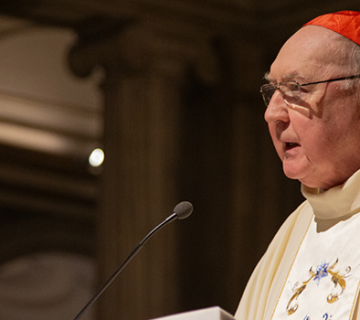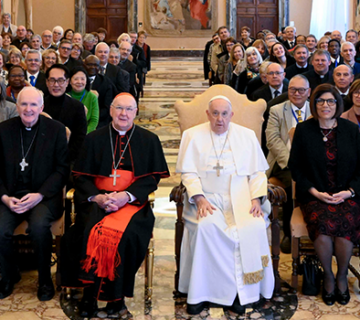 The Hungarian leg of Maria Voce and Giancarlo Faletti’s Eastern European tour has brought them to the heart of a local community bursting with vitality.
The Hungarian leg of Maria Voce and Giancarlo Faletti’s Eastern European tour has brought them to the heart of a local community bursting with vitality.
The first appointment on their busy schedule was a meeting with priests who know the Movement. Many of them are responsible for the diffusion of the Focolare in the area and their meeting with the president and co-president was a chance to share their countless experiences. Some told about their commitment to rebuild the Church; others about their service as parish priests, seminary directors and vicar generals; others about their role at university or diocesan levels or their simple, everyday relationships with people, building a sense of community and attracting young people and those without religious convictions. As well as concrete experiences they shared about the life of communion that sustains and nurtures everything.
 Next step: a meeting with the delegates of the various branches that make up the Focolare Movement in Hungary. The families spoke about their wide-ranging work with newly-wed and engaged couples, with divorced people and with families of all ages. The delegates of New Humanity- who coordinate the Focolare Movement’s work in the social arena- spoke about activities in the fields of economics, politics, health, education and sport. Lay people and priests told about renewal underway in parishes throughout the country’s 13 dioceses.
Next step: a meeting with the delegates of the various branches that make up the Focolare Movement in Hungary. The families spoke about their wide-ranging work with newly-wed and engaged couples, with divorced people and with families of all ages. The delegates of New Humanity- who coordinate the Focolare Movement’s work in the social arena- spoke about activities in the fields of economics, politics, health, education and sport. Lay people and priests told about renewal underway in parishes throughout the country’s 13 dioceses.
The meeting was enriched by an open dialogue touching on many aspects. One of the concerns addressed was the balance between a local and universal dimension. “The ideal to fulfil Jesus’ last testament- ‘That all may be one’- was born in the small town of Trent and went on to assume a global dimension”, Maria Voce recalled, “This means that looking after smaller details is a school of love that opens our horizons. Opening our horizons to universal brotherhood does not mean, therefore, that we shouldn’t take care of the smaller details”. And later Voce underlined the other face of the coin: “We feel pushed to go beyond our boundaries. We can’t lose interest in the Movement’s big family spread throughout the world- let’s try to stayed linked with all means possible.”
A Gen 2 girl asked a question about spiritual input, giving the president a chance to speak about one of the legacies that Chiara Lubich wished to leave her followers: “Leave the Gospel and only the Gospel to those who follow you”. All the other things are instruments that help us put that Gospel into practice and render it a concrete reality, Maria Voce explained but “the most important thing is to live the Word of God. We must always ask ourselves: ‘How Jesus would live?’”.
 Both during the meeting with the movement’s delegates and at the gathering the following day with the men and women focolarini who live in Hungary, questions arose about how to improve interpersonal relationships- an important subject for those who live a collective spirituality. An ever greater love became the leitmotif of the meetings: a love that demands our all; a love that’s free from perfectionism or the desire to reach a certain result; a love capable of going beyond differences between men and women, between big and small, between people with different roles; a love that generates, that puts your life at stake to the point of ‘allowing Jesus to live in you’. “I have been created as a gift for who is beside me and who is beside me has been created as a gift of God for me”, Chiara Lubich often repeated with conviction. Maria Voce underlined this to all present, reminding them of the model that always inspired Chiara: “The family of Nazareth or, even greater, the life of the Trinity”. This is the highest of relationships, the upmost love- a bold but inimitable model.
Both during the meeting with the movement’s delegates and at the gathering the following day with the men and women focolarini who live in Hungary, questions arose about how to improve interpersonal relationships- an important subject for those who live a collective spirituality. An ever greater love became the leitmotif of the meetings: a love that demands our all; a love that’s free from perfectionism or the desire to reach a certain result; a love capable of going beyond differences between men and women, between big and small, between people with different roles; a love that generates, that puts your life at stake to the point of ‘allowing Jesus to live in you’. “I have been created as a gift for who is beside me and who is beside me has been created as a gift of God for me”, Chiara Lubich often repeated with conviction. Maria Voce underlined this to all present, reminding them of the model that always inspired Chiara: “The family of Nazareth or, even greater, the life of the Trinity”. This is the highest of relationships, the upmost love- a bold but inimitable model.
From our correspondent Aurora Nicosia


 Italiano
Italiano Español
Español Français
Français Português
Português


